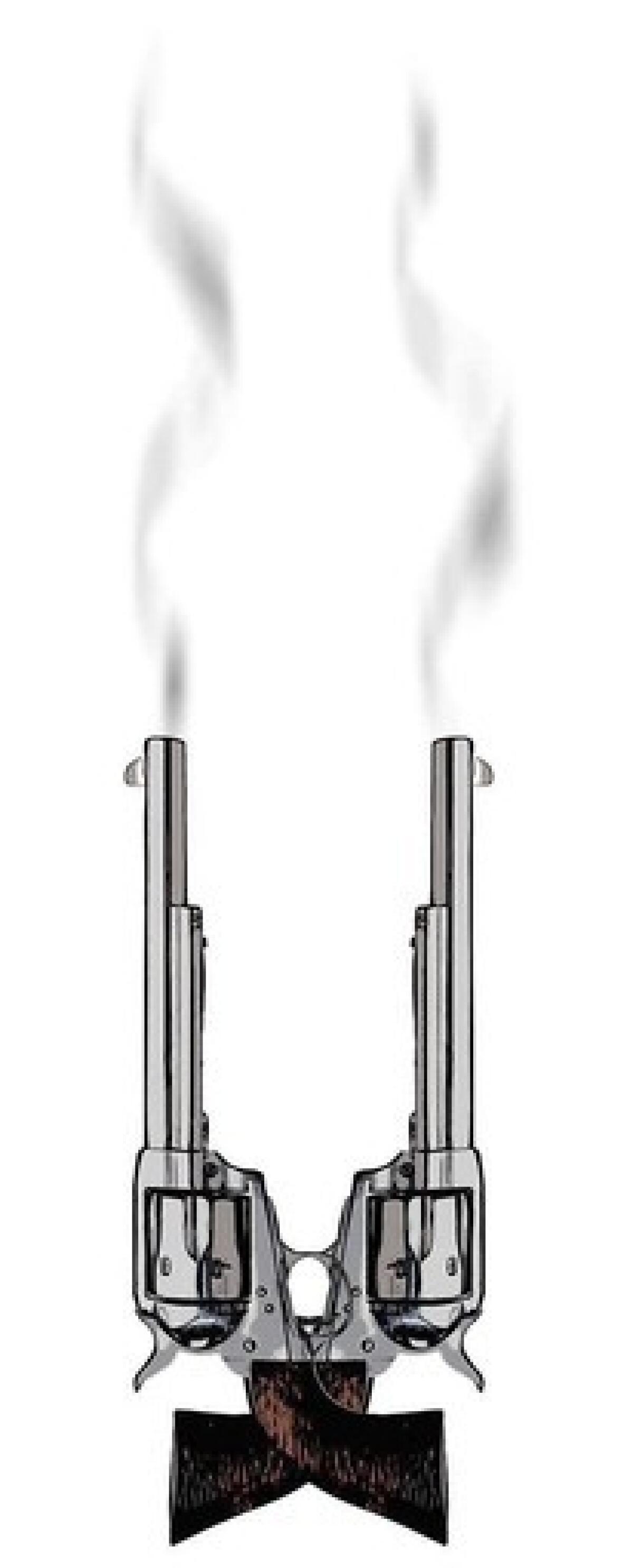Book Review: ‘The Sisters Brothers’ by Patrick deWitt

- Share via
The Sisters Brothers
A Novel
Patrick deWitt
Ecco: 336 pp., $24.99
If Cormac McCarthy had a sense of humor, he might have concocted a story like Patrick deWitt’s bloody, darkly funny western “The Sisters Brothers.”
It’s 1851, and Eli and Charlie Sisters make their way from Oregon to California to kill a man. Eli, the larger one, tells the story, which opens with him thinking a lot about horses and not quite realizing that his brother and their boss, known as the Commodore, are shorting him.
If Eli is a little slow, he’s also coming awake — compassion is unfolding in him, and he’s considering the possibility of a new life. As the book follows the Sisters brothers on their quest to assassinate one Hermann Kermit Warm, it also tracks Eli’s change. He starts out a brute who goes blank with murderous rage and soon becomes an equally brutish man pleased by the minty taste of the toothpowder a dentist gives him. Just how civilized will he become?
The quest story goes way back — back to “Don Quixote” and, beyond that, to “The Odyssey” — and, just as in these works, between the Sisters brothers and Hermann Kermit Warm there inevitably are a number of adventures and life-changing encounters.
There is that dentist, working alone on the frontier, jolly after a series of failures with valuable “modern” medical techniques. There are brusque hotel proprietresses, one of whom Eli falls for. There is a lady accountant, and he falls for her too; he’s a murderer, sure, but also a bit of a softie. She works for a wealthy, dangerous brothel owner, whose easy life appeals to Charlie. There are, of course, evil henchmen, stable hands, a crone who may be a witch and miners gone something close to mad. At one point, the brothers come across a desiccated wagon train and its lone survivor, a starving adolescent with a worthless horse, Lucky Paul.
“I wished the boy safe travels, but these were empty words, for he was clearly doomed…He stood there weeping and watching us go, while behind him Lucky Paul entered and collapsed the prospector’s tent, and I thought, Here is another miserable mental image I will have to catalog and make room for.” There is a lighthearted exasperation in Eli’s words.
Despite being not entirely quick, Eli’s voice makes reading the book a treat. It’s smooth and seamless, shot through with dark humor, pared and antique without being Baroque.
“The Sisters Brothers” frontier is more poetic than realistic but as easy to slip into as the old HBO series “Deadwood.” But where an onscreen western shows the setting, this book has few descriptions of landscape or buildings they visit. What gets described, instead, are bodily woes. Charlie’s bad drunks and worse hangovers include lots of vomiting, Eli has injuries that bleed and swell, and the decline of Tub, Eli’s horse, after getting swatted by a grizzly is, in the end, grisly.
There is something very human in all this blood and guts, in their grim and gross and comic physicality. This humanness, with the humanness that Eli is growing into, give the novel a warmth and depth.
Charlie takes on a deeper dimension. Charlie to Eli: “‘Do you think your mangled, brainless horse can make it to the next town without hurtling itself off a cliff? What’s that? You’re not smiling, are you? We’re in a quarrel, and you mustn’t under any circumstances smile.’ I was not smiling but then began to, slightly. ‘No,’ said Charlie, ‘you mustn’t smile when quarreling. It’s wrong and I dare say you know it’s wrong. You must stew and hate and revisit all the slights I offered you in childhood.’”
Eventually they get to San Francisco, late for their meeting with advance man Henry Morris, who’s supposed to lead them to their target, Warm. The city is in the grips of the gold rush: Morality and honor seem absent — except for what they hear of one man: Warm. A small and unattractive chemist, Warm may hold the key for what they want: For Charlie, that’s wealth and power; for Eli, it’s getting out of the assassination business. But that would mean the fearsome Sisters brothers would come to an end. And in a novel packed with death and debasement, is it possible for everyone to get what they want?
This novel has little in common with deWitt’s first, “Ablutions,” a fits-and-starts telling of a contemporary Hollywood bartender in disastrous decline. He has shifted here radically, successfully, to an entirely different time period, from a tale of solitude to brotherhood, from self-erasure to becoming more human. The only thing the books share is a skillfully polished voice and a penchant for gleefully looking under bloody bandages.
More to Read
Sign up for our Book Club newsletter
Get the latest news, events and more from the Los Angeles Times Book Club, and help us get L.A. reading and talking.
You may occasionally receive promotional content from the Los Angeles Times.










